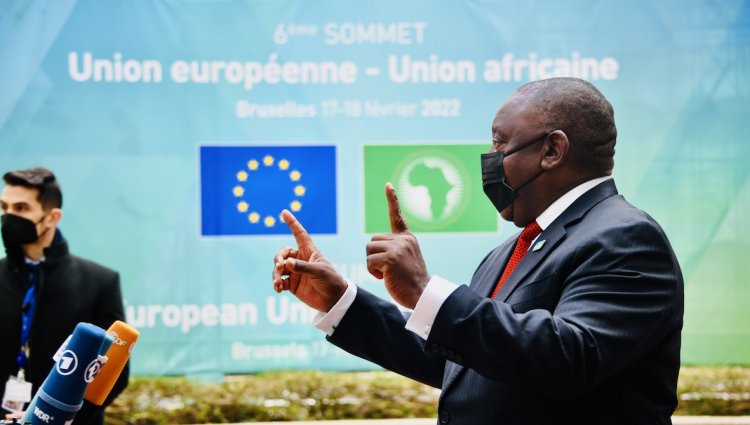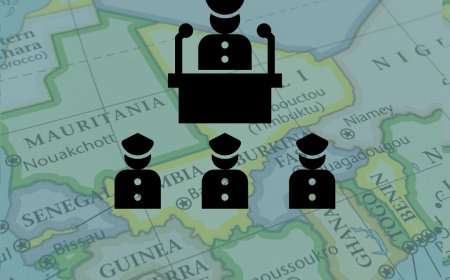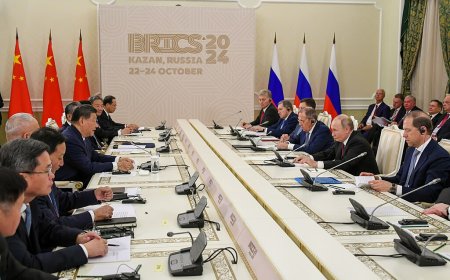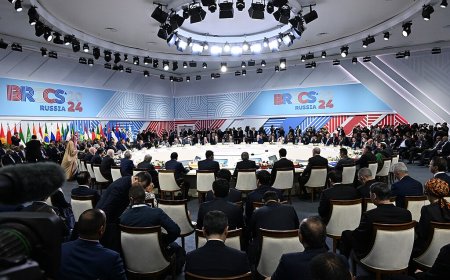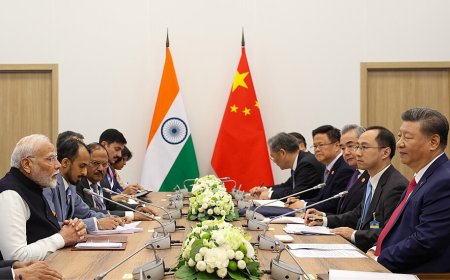This article is part of a series on the effects of the war in Ukraine on African countries. The series is edited by Chris O. Ogunmodede.
Summary
- Africa-EU relations remains in flux despite the promise of the most recent AU-EU Summit
- Russia's war in Ukraine is likely to exacerbate the fragility of this hierarchical relationship
- China is shoring up support for African positions on the war in Ukraine by amplifying African critiques of the US-led international order.
- Recent commentary on Africa-EU relations in the context of this conflict often lacks nuance, particularly in relation to Africa's broader international relations
- Changes in the EU's security assistance underscores some of the challenges in Africa-EU relations
- Overall, Africa-EU relations must be based on mutual respect to avoid further deterioration.
Introduction
The 2022 African Union-European Union Summit came and went with a whimper. The latest grand meeting of African and European leaders, the sixth of its kind since the summit’s inception in 2000, was the subject of much anticipation. This was partly because of the summit’s 18-month delay due to the coronavirus pandemic, but also because the 2022 gathering was intended to launch the EU’s new approach to relations with the African Union, its institutions as well as the bloc’s member states. The sixth AU-EU summit happened against a backdrop that placed Africa at the centre of new geopolitical tensions and a jostling for influence that involves the EU’s main rivals including China and Russia. There is a continued emphasis on a ‘partnership of equals’ underscored by a commitment to jobs, economic growth and commercial investment funnelled through a newly launched Global Gateway initiative. The EU thus appears to be doubling down on Commission President Ursula von der Leyen’s signal that Africa will be a priority for her “geopolitical commission.”
The Ukraine War leaves Africa-EU Relations in Limbo and Confused
The latest AU-EU summit was described by the EU as an opportunity to “reset” fraying relations with Africa. Recently, relations had been challenged by disputes over thorny issues like migration, the coronavirus pandemic, vaccine inequality and a travel ban imposed on southern African countries, in the wake of the discovery of the omicron variant. But this year’s gathering happened barely a week before Russian troops invaded Ukraine, thus downgrading Africa as a priority for the European side. One prominent example of the EU’s divided attention is its failure to finalise the replacement of the Cotonou Partnership Agreement. For two decades, Cotonou was the legally binding legal framework that regulated the relationship between African countries and the EU. It marked a departure from previous agreements between the EU and Africa expanding the focus of cooperation to include aid, trade and political cooperation. Although negotiations for the partnership agreement’s replacement started in 2018, and a new agreement was published in 2021, it is yet to be signed. This leaves the key framework for Africa-EU relations in a limbo of sorts. The lack of significant movement on the agreement’s replacement comes as no surprise, however, as the EU has put its time and resources toward creating a united front among its member states amid the bloc’s efforts to counter Russia’s imperialist war in Ukraine.
It is further unsurprising that a significant volume of the post-summit analysis would situate the ongoing war in Ukraine as well as its ramifications within the broader discourse of Africa-Europe relations. Many commentators have focused on the conflict’s global impact like food insecurity, trade disruptions and the skyrocketing price of food and other essentials, none of which Africa will be exempt from. Others have focused on African reactions to the outbreak of war in Ukraine, as well as what African positions on Ukraine-related votes at the United Nations might signal to Western powers, including the EU. But while some analysts are sounding the alarm on the impact the war in Ukraine might have on the future of security cooperation between Europe and Africa, others have sought to assuage those concerns. In other words, there is no consensus about the state of Africa-Europe relations in the context of Russia’s invasion of Ukraine.
Thinking beyond Europe in Africa-Europe Relations
Often, the language used to characterise Africa-Europe relations is overwhelmingly aimed at a European audience, and scarcely considers let alone reflects African perspectives. Presumably, Africans would have something to say about their international relations in the context of newer developments in global affairs. But on the rare occasions African perspectives are sought after, Africa tends to be spoken for by well-meaning European think tanks and civil society. Invariably, policy discussions and analyses of the relationship between Africa and Europe reflect Eurocentric perspectives, including in diagnoses of areas of improvement and the recommended solutions. But how do Africans think about relations between Africa and Europe, and how global developments like the Russia-Ukraine conflict impact them? To borrow Gatayri Spivak’s quote, can the subaltern speak? In a sense, the conflict in Ukraine already reflects—some might argue reinforces—the historical imbalance that has typified Africa-Europe relations regardless of whatever feelings of pessimism or optimism about its future might exist. But the present situation bears important implications for the future of Africa-Europe relations, as well as whether it can move past the current impasse.
It is therefore worth asking this question, how do African political elites interpret their countries’ relationship with Europe within the broader context of war in Europe? Here, I will focus specifically on peace and security.
The relationship between the EU and its African partners is one of its oldest foreign policy frameworks. Well before the Maastricht Treaty created the pillar system within which the bloc’s Common Foreign and Security Policy, or CFSP, emerged, the original members of the European Economic Community—the EU’s predecessor organisation—committed to structured relations with former European colonies in Africa. To an extent, this reinforced the existing colonial dynamics in the relationship.
While many, including in the EU, have long been concerned about this asymmetric relationship, African countries have also grown increasingly impatient with it. That tension was apparent in the lead up to the 2007 Joint Africa-EU Strategy as well as this year’s summit.
In recent years, the relationship between the EU and African countries has been more fractious than cordial. On the one hand, the EU continues to weather challenges to its identity, with the eurozone crisis, the rise of far-right populism, the coronavirus pandemic and, more recently, war at its borders, having upturned the union’s politics over the last decade.
On the other, the EU has challenged even those areas where African actors have exercised some more agency in the relationship. The establishment of the European Peace Facility, which was created to replace the previous African Peace Facility, or APF that allowed African leaders to determine the scope of security actions, stands out as a case in point. The APF was funded by the EU to support the development of the continental African Peace and Security Architecture, or APSA. But unlike with the APF, the EPF allows the EU to bypass the AU on key decisions affecting security on the continent. While the EPF creates more room for bilateral relations between the EU and individual Africa countries, it remains to be seen what this means for the ambitions of a robust continental security architecture. There are concerns among many African observers that the EU’s move towards geopolitics and “pragmatism” will lead to an escalation in militarisation and interventionism on the continent. This is all the more significant since the EU own priorities can undermine African security plans. There are also practical implications involved. In theory, bilateral disbursements for security assistance through the EPF could prioritise African countries. But that might not be the case in practice; this year alone, 2.5 billion out of the 5.69-billion-euro budget allocated to the EPF has gone towards arming Ukraine to defend itself against Russia.
The precarity of the EPF’s disbursements is exacerbated by the lack of an alternative to the APF prior to the creation of the EPF, the implications of which have become more evident following the outbreak of war in Ukraine. While reliance on the EU did not necessarily conflict with the AU’s ability to determine its own priorities, the funding gap—and the imbalance it creates—nevertheless has had an impact on the institutionalisation of sustainable financing for African peace and security initiatives.
Invariably, African countries have sought out other security partnerships, as well as financial and other forms of assistance to bolster their security operations from whoever is willing to provide them. This has meant more collaborations with the United States, China, Japan, India, and Russia, as well as bilateral collaborations with individual EU member states. These arrangements appear to be a “Plan B” to compensate for the new peace and security arrangement between the AU and the EU, in lieu of exclusive APF support. To be sure, most of these collaborations do not seek to support the continental peace and security architecture . Rather, these newer relationships appear to be mainly instrumental to African countries getting what they need from their international partners. The transactional nature of the interactions is perhaps why Russian leaders have ramped up diplomatic outreach to African countries, looking for new partnerships in the context of the war in Ukraine. Most of Russia’s engagement with African governments bode poorly for long-term peacebuilding efforts for African citizens, however, despite their convenience for African political and security elites. These critiques, however, also extend to security policies pursued by the EU and its member states in places like Niger and Libya. In the context of the Ukraine war, it is thus too simplistic to interpret African calls for dialogue and respect for the rule of law as taking sides with Russia or reflective of the success of Russian disinformation campaigns.
While African positions might appear less than full-throated in the face of what is a one-sided Russian aggression toward a sovereign Ukraine, I would argue that much like the EU, pragmatism is the main driver of Africa’s various positions. To ignore the broader conditions under which the AU and its member states are exercising their agency to choose their partners and determine their position on key issues of peace, security and governance poses a risk to the future of Africa-Europe relations. A failure to acknowledge the nuances of African responses to international affairs by dismissing them as mere outputs of propaganda reinforces the idea that the EU does not respect Africa and Africans. It would be difficult to envision an opportunity to improve Africa-Europe relations if a lack of respect is the prevailing sentiment undergirding ties between the EU and its African partners. And, it is fair to assume that the EU realises this too.
About the Author
Dr Toni Haastrup is Professor in International Politics at the University of Stirling. Her research broadly explores the nature of global power hierarchies (between the Global North and South) in knowledge and practice. I have worked in the area of global governance of security via regional security institutions - the African and European Unions. A part of her current research agenda draws on critical feminisms to understand the foreign policy practices of both institutions. In addition to research and teaching on gender and international security issues she sometimes offers media commentary, and advice to international organisations. Toni is a graduate of University of California, Davis (BA), University of Cape Town (MA), and the University of Edinburgh (PhD).
